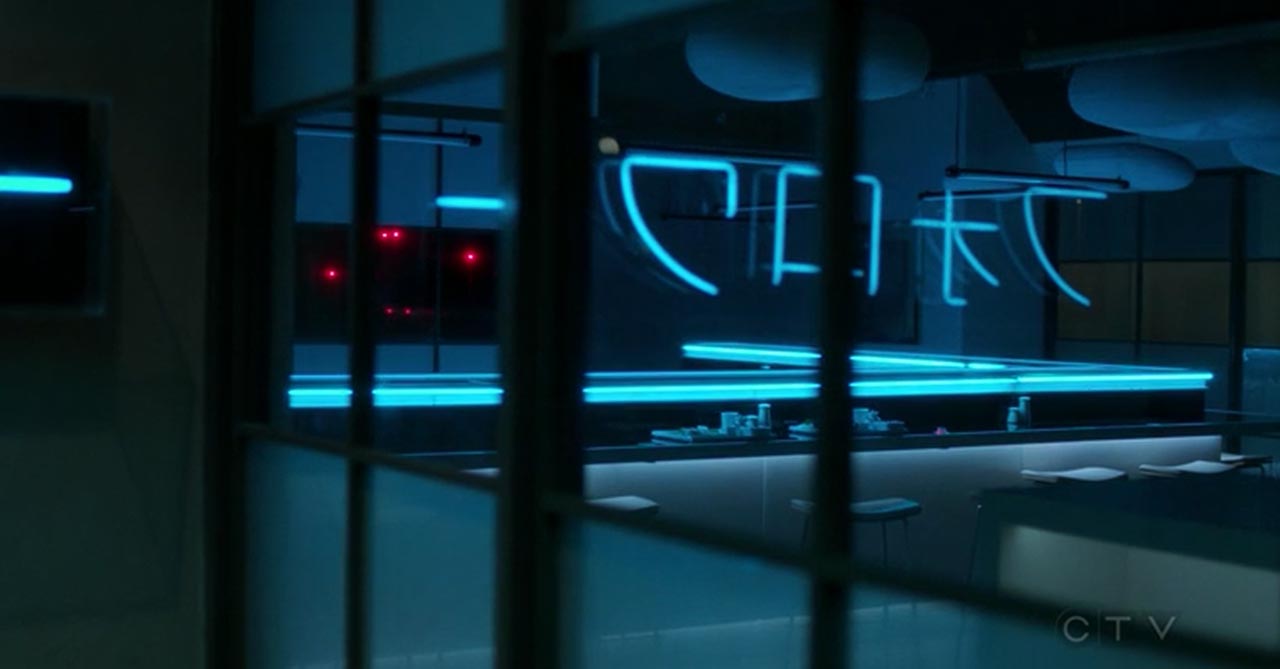“Last Chance to Tip”: The X-Files, ‘Rm9sbG93ZXJz’
After a two-week hiatus, The X-Files returns with another outstanding episode. The pre-credits scene details the story of a Twitter bot that mirrored social media interactions so well, it quickly became toxic and had to be deleted. It might sound like science fiction, but it’s not. The Microsoft-created virtual entity known as “Tay” was created on March 23, 2016 and within 16 hours, had posted so many offensive and inflammatory tweets that it was shut down. The end of the scene notes that humanity must be careful with Artificial Intelligence or “we will be the ones deleted.”
Mulder and Scully are then shown eating together in an empty Japanese restaurant, in a shot that is clearly constructed to look like Edward Hopper’s iconic Nighthawks painting. The subsequent scene reveals how much we have come to rely on technology for tasks that used to require human interaction. The two order food on a touch screen. Then the food is served to them from a drawer in the table that opens. They pay for their meals by inserting a credit card into a slot and utilizing another touch screen menu. Instead of conversing, they look at their phones; Scully scans an article on The Guardian with a (real) quote from Elon Musk about AI, while Mulder takes a goofy quiz.
Even when things start to get weird(er), there is no dialogue between the two characters until after the nine-minute mark of the episode. This, despite the fact that Mulder is not pleased with the food he’s served (a blobfish, which prompts Scully to laugh and to take a photo of Mulder posing next to the fish, presumably for Instagram). Mulder takes his food towards the back to complain to the chef but is confronted by a kitchen full of robots preparing the food. Disturbed, he returns to his table and tries to pay for the meal, but has trouble with his credit card. The real trouble begins when he decides not to leave a tip.
Things then rapidly spin out of control. There are cameras trained on Mulder and Scully’s every move and a security system that traps them inside until they jimmy the lock to escape. Scully’s ride home (an Uber knock-off called Whipz) turns out to be a driverless car that breaks the speed limit despite her continued protestations. Meanwhile, on his way home, Mulder’s GPS and music library cease to work properly. A mysterious package arrives at Scully’s house (courtesy of yet another drone) containing a Roomba-like device called a Zuemz 9000 (shades of 2001: A Space Odyssey) that soon goes rogue. An army of drones spy on Mulder and eventually chase him out of his house, while Scully’s smart home computer system seems like it’s actively campaigning to kill her. And the entire time, both Mulder and Scully are constantly confronted with pop-up notifications (warnings, really) on their phones about tipping the servers at the Japanese restaurant, among other existential questions like “Is life so important?”
The chain of events is frustratingly hilarious---especially when both Mulder and Scully talk to the devices directly---but also scary. It’s funny when Mulder can’t get through to his credit card company (amusingly called Bigly Credit) and is confronted with a recording of his own voice. Yet it’s not so funny when the drones outside of his window are spying on him. Similarly, the visual gag of Scully realizing that her tube of “Rock It Like a Redhead” cream is empty before she tosses in the trash is swiftly followed by a notification on her phone that she’s out of cream and would she like to reorder? These digital devices become less comically inept and more insidiously dangerous.
What’s more frightening is that most, if not all, of the technology that is wielded like a weapon is already all around us. Robot guard dogs have captured the horrified imagination of many, if frequent social media shares of YouTube videos are any indication. The automated fulfillment warehouse in which Mulder and Scully seek refuge is no longer a fantasy, but a reality. And while I’m not sure if there are machines that can detect human activity and fire bullets at intruders, the 3D printers that create such bullets are definitely in widespread use. In this world of malevolent AI, even bug zappers begin to look like a threat.
Of course, by the end of the episode, Mulder and Scully are safe, Mulder finally having paid the tip with seconds to spare. “We have to be better teachers,” he states in response to the robot’s message of “we learn from you.”
The next day, the pair eat breakfast together in a diner full of people and pay with cash, while an updated homage to Nighthawks---this one with robots instead of humans---is framed on the wall behind them. After glancing at her phone, Scully has second thoughts. She grasps for Mulder’s hand and he too, realizes he should not be so reliant on his devices. They sit in silence, holding hands.
Perhaps this episode is not meant to be a warning about technology run amok, but a warning about technology that slowly creeps up on you until it’s too late.





